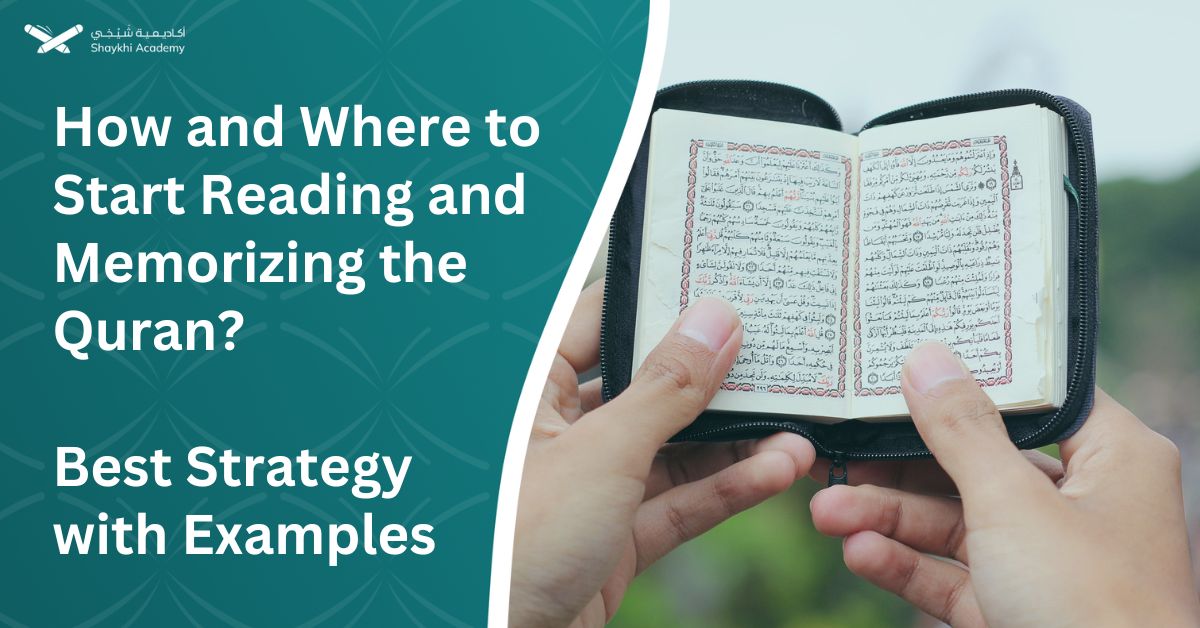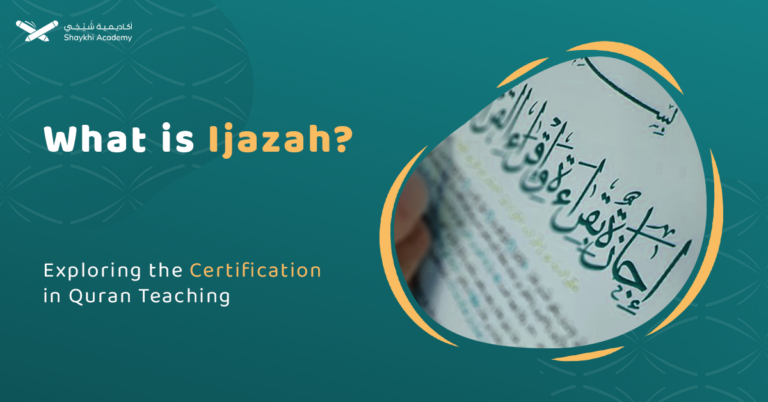Do You want to start Reading and Memorizing the Quran? Diving into the enriching journey of Quranic memorization, beginners often ponder where to start and how to navigate the path effectively. From selecting a qualified reciter to embracing structured schedules and understanding the verses, embarking on Hifz Quran requires thoughtful planning and dedication.
But where should one begin? Is Tajweed essential from the outset? And how easy is it to embark on this spiritual endeavor? Join us as we explore these questions and unveil practical strategies for beginners to embark on their journey of memorizing and reading the Quran with confidence and ease.
In a nutshell, To embark on the journey of memorizing the Quran effectively, beginners should begin by selecting a qualified reciter and a single Mus’haf for consistency. Establish a structured schedule, set sincere intentions, and trust in Allah’s guidance. Start with simpler sections, understand the verses’ meanings, and memorize them verse by verse.
How to Start the Hifz Quran?
To begin memorizing the Quran effectively, start by selecting a qualified reciter and a single Mus’haf for consistency. Establish a structured schedule, set intentions, and trust in Allah’s guidance. Begin with simpler sections, understand the verses, and memorize them verse by verse. Ensure regular revision, listen to recitations, seek support, and avoid common mistakes like overloading and irregular reviewing. With dedication and perseverance, the journey of Quranic memorization can be fruitful and rewarding. Let’s explain in detail!
1. Selecting a Qualified Reciter
Begin by choosing a reciter with a beautiful and clear voice, akin to renowned reciters such as Al-Minshawi. The reader should possess the ability to recite with proper tajweed and clarity, without the use of sound effects or embellishments.
2. Choosing a Single Mus’haf
Opt for a single physical copy of the Quran for memorization purposes. It’s crucial to have consistency in the format and layout of the Quranic text to facilitate memorization. Electronic versions or applications may vary in presentation, which could disrupt the memorization process.

3. Establishing a Memorization Schedule
Develop a structured schedule for memorization and review. Allocate specific days for memorization, such as Sunday to Thursday, with Fridays and Saturdays reserved solely for review. Additionally, plan periodic comprehensive review sessions every few weeks to ensure retention of all memorized verses.
4. Setting Intentions and Trusting in Allah
Before commencing the memorization journey, make sincere intentions and put trust in Allah’s guidance and support. Remember that memorization progress should be approached according to one’s capacity and ability.
5. Starting with Easy Sections
Initiate the memorization process with simpler sections, such as Juz Amma (30th section) or Juz Tabark (29th section), due to their concise and straightforward nature. This approach eases the initial stages of memorization.
6. Understanding the Verses
Prior to memorization, read a simplified explanation (tafsir) of the surah or verses. Understanding the context and stories within the Quranic text facilitates easier memorization by providing insights into the meaning and significance of the verses.
7. Memorizing Verse by Verse
Begin memorization by reciting each verse from the Mushaf and then repeating it without looking. It’s advisable to memorize not only the verse but also a few words from the subsequent verse to establish continuity and facilitate recall during recitation.
8. Frequent Revision throughout the Day
Incorporate regular revision sessions throughout the day. Utilize prayer times for reciting memorized portions or keep a written record for reference and revision during idle moments or before bedtime.
9. Listening to Recitations
Enhance memorization by listening to audio recitations of the memorized verses frequently. Repetitive exposure to the recitation aids in reinforcing memorization and improving recitation fluency.
10. Seeking Support and Encouragement
Engage with a supportive companion, such as a friend, family member, or mentor, who can provide encouragement, correct errors, and offer motivation throughout the memorization journey. Sharing recitations with others not only fosters accountability but also strengthens bonds within the community.
11. Consistent Review in Daily Activities
Prioritize reviewing memorized portions during prayers, free moments, or before sleeping. Consistent review is vital for long-term retention and mastery of memorized verses.
– Here are some common mistakes that beginners make when memorizing the Quran:
- Trying to memorize too much at once.
- Not reviewing the material regularly.
- Not using a variety of techniques to help them memorize.
- Getting discouraged and giving up.
If you avoid these mistakes, you will be well on your way to memorizing the Quran.
What is the Best Strategy for Memorizing the Quran for Beginners?
In this section we will provide a step-by-step example to illustrate the best simple memorization strategy for beginners. Let’s assume you want to memorize the first page of Surah Al-Mulk.
First: Focusing on the First Segment
- Open your designated mushaf. Locate the first page of Surah Al-Mulk in the mushaf you have dedicated for memorization.
- Concentrated visualization. Look closely at the first segment of the first ayah: “تَبَارَكَ الَّذِي بِيَدِهِ الْمُلْكُ” [Al-Mulk: 1]. Concentrate on this specific segment as if memorizing an image. Imagine etching it into your mind.
- Deep breath and recitation. While focusing on the segment, take a deep breath as recommended earlier. Read the segment aloud and clearly two or three times. Try varying the speed and style of your recitation each time.
- Testing memorization with eyes closed. Close your eyes tightly and recite the segment from memory. Repeat this until you feel confident in your recall.
Second: Connecting Segments and Verses
- Moving on to the next segment. Open your eyes and proceed to the next segment of the same ayah: “وَهُوَ عَلَى كُلِّ شَيْءٍ قَدِيرٌ”.
- Repeating the process. Apply the same steps used for the first segment: focused visualization, deep breath, recitation variations, memorization with closed eyes, and repetition for mastery.
- Connecting segments within a verse. Once you’ve memorized both segments individually, recite the entire first ayah (both segments combined) several times while your eyes are closed.
Third: Progressing Through Ayahs and the Page
- Memorizing the second ayah. Follow the same steps (segmenting, focusing, reciting, memorizing with closed eyes) to memorize the second ayah. Divide the ayah into manageable segments (ideally under five words each).
- Connecting within and between ayahs. After memorizing each segment individually, connect them in order while your eyes are closed to complete the ayah. Then, connect this second ayah to the first ayah from memory, reciting both while your eyes are closed.
- Repeating the pattern. Use the same method (segmenting, focusing, reciting, memorizing with closed eyes, connecting) to memorize the third ayah and connect it to the previous two ayahs for cumulative recall.
- Continuing to the end of the page. Follow this pattern of segmenting, memorizing, and connecting throughout the remaining ayahs on the page or until you’ve reached your designated amount for memorization.
Fourth: Reviewing and Strengthening Memorization
- Verifying memorization of the entire section. Once you’ve memorized your designated portion, recite the entire passage from memory while your eyes are closed, repeating at least ten times to solidify memorization.
Bonus Tip: Linking Ayah Endings and Beginnings
- Enhancing connections between ayats. This is a helpful technique to strengthen the connection between ayats during memorization and revision. When memorizing a new ayah, add a word or two from the beginning of the following ayah to the end of the ayah you’re currently memorizing, as if they are one continuous segment. For example:
“تَبَارَكَ الَّذِي بِيَدِهِ الْمُلْكُ وَهُوَ عَلَى كُلِّ شَيْءٍ قَدِيرٌ * الَّذِي خَلَقَ” [Al-Mulk: 1, 2].
This method can also be beneficial for linking ayahs across pages, which can be a hurdle for many memorizers.
By following these steps and incorporating the valuable tip, you can effectively memorize the Quran one segment, ayah, and page at a time.

– Here are some additional tips for memorizing the Quran:
- Make dua for guidance and assistance from Allah.
- Set a schedule for memorization and stick to it.
- Find a quiet place where you can concentrate.
- Use a variety of techniques to help you memorize, such as listening to recordings of the Quran, writing down the verses, and using mnemonic devices.
- Be patient and persistent. Memorizing the Quran takes time and effort, but it is a very rewarding experience.
Where to Start Memorizing the Quran?
Start with shorter Surahs. Embarking on the rewarding journey of memorizing the Quran can feel daunting at first. Choosing the right Surahs (chapters) to begin with is crucial for building confidence and momentum. This guide offers valuable recommendations to streamline your selection process.
Since memorization is a skill honed through practice, starting with shorter Surahs is a wise strategy. Conquering concise chapters early on provides a sense of accomplishment and fuels your motivation to tackle more extensive ones later.
Juz Amma
The Quran is divided into 30 Juz (parts), with Juz Amma referring to the final 30 parts. This part is renowned for its abundance of concise and relatively easier-to-memorize chapters. Many of these Surahs are frequently recited in daily prayers, making them particularly valuable for beginners as they become ingrained in your daily routine.
Selecting Surahs that Speak to Your Heart
Choosing Surahs that resonate with you on a personal level can significantly enhance your memorization experience. Select chapters that evoke emotions or hold deep meaning for you, transforming memorization into a more engaging and enriching journey.
What are the Surahs to Start with?
Here are examples of Ideal Starting Surahs (all found in Juz Amma):
- Surah Al-Ikhlas (Chapter 112): A captivatingly short Surah with profound meaning about the oneness of Allah. Its brevity makes it an excellent starting point.
- Surah Al-Falaq (Chapter 113) & Surah An-Nas (Chapter 114): Both these concise Surahs offer a beautiful prayer seeking refuge in Allah from various forms of evil.
- Surah Al-Kawthar (Chapter 108): Holding the distinction of being the shortest Surah in the Quran, this three-verse chapter is a great option to begin building your memorization foundation.

Should I Prioritize Tajweed at the beginning of memorizing the Quran?
Yes! Tajweed, the art of reciting the Quran with proper pronunciation and articulation, is crucial from the very beginning of memorizing the Quran (Hifz).
Just as you wouldn’t build a house on a shaky foundation, memorizing with incorrect pronunciation can lead to difficulties correcting them later.
Learning Tajweed alongside memorization ensures you’re internalizing the Quran accurately from the start, making recitation more beautiful and preventing errors that could alter the meaning of the verses.
Should you Focus on Understanding at the Beginning of Hifz?
Yes, focusing on understanding the meaning of the Qur’an is crucial at the beginning of Hifz (memorization). While memorization is a key aspect, grasping the message strengthens memorization and fosters a deeper connection with the text.
Understanding the stories, teachings, and commandments allows the learner to recite with more focus and intention, and lays the groundwork for future study and application of the Qur’an’s wisdom in their life.
How easy is it to begin Memorizing and Reading the Quran?
The ease of starting to memorize and read the Quran can vary depending on individual factors such as prior knowledge of Arabic, familiarity with Islamic teachings, and personal dedication. For those already fluent in Arabic or with a background in Islamic studies, the initial steps might feel more straightforward. However, for beginners or those less familiar with the Arabic language or Islamic concepts, starting may require more effort and time.
Various resources are available to facilitate the learning process, including Quranic teachers, online courses, mobile applications, and printed materials designed for beginners. Consistent practice, dedication, and seeking support from knowledgeable individuals can greatly aid in the journey of memorizing and reading the Quran.
Here are some factors that can influence ease:
- Age: Children tend to pick up languages quicker.
- Prior Arabic knowledge: If you already know Arabic, learning to read the Quran will be much easier.
- Time commitment: Regular practice is key to memorization.
- Learning style: Some people learn better visually, auditorily, or kinesthetically. There are resources to suit different styles.

Ready to Begin Your Quranic Journey with Shaykhi Academy?
Are you an adult interested in learning the Quran but don’t have the time or resources for traditional classes? Shaykhi Academy‘s Learn Quran Online for Adults Course – Beginners Course is the perfect solution for you!
This comprehensive program will equip you with the foundational skills you need to confidently recite the Quran. You’ll learn:
- Arabic Alphabet Recognition & Pronunciation: Master the Arabic alphabet and pronunciation, the building blocks of Quran recitation.
- Tajweed Rules: Grasp the essential Tajweed rules to recite the Quran beautifully and accurately.
- Strong Quranic Recitation Foundation: Build a solid base for your Quranic recitation journey.
Our flexible online learning format offers:
- Convenience: Learn from the comfort of your own home on your own schedule.
- Personalized Instruction: Receive tailored guidance from qualified Quranic tutors.
- Interactive Lessons: Engage with interactive materials that make learning enjoyable.
- Affordable Pricing: Invest in your spiritual growth at a budget-friendly price.
Book your FREE TRIAL in Shaykhi Academy’s Learn Quran Online for Adults Course – Beginners Course today!

Conclusion
In conclusion, memorizing the Quran, while demanding dedication and perseverance, is an achievable and rewarding journey. By following a structured plan that incorporates selecting a qualified reciter, starting with shorter surah sections, and prioritizing consistent review, you can effectively memorize the Quran. Remember to seek guidance from Allah and make dua for assistance throughout this spiritual endeavor.

















































